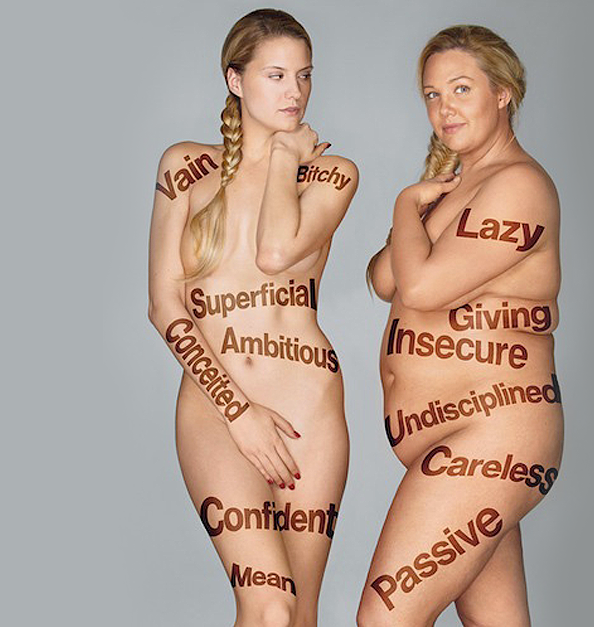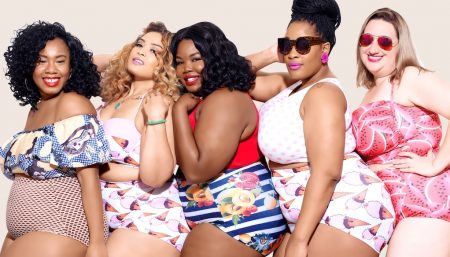Body Shaming is defined by Urban Dictionary means Shaming someone for their body type.

Did you ever stop and think about how often we are told to change our appearance? Magazines constantly offer tips about how to lose weight “in days,” appear slimmer “instantly,” and hide our “imperfections”… without actually knowing anything about us, much less our appearance. This is one example of body-shaming, and it is everywhere. Sitcoms so frequently use overweight characters’ bodies as the basis of many of the show’s jokes. It has become the norm to criticize aspects of our bodies as some type of bonding experience with friends – if we all hate our bodies; it somehow makes us feel connected and united.
Body-shaming (criticizing yourself or others because of some aspect of physical appearance) can lead to a vicious cycle of judgment and criticism. Messages from the media and from each other often imply that we should want to change, that we should care about looking slimmer, smaller, and tanner. And if we don’t, we worry that we are at risk of being the target of someone else’s body-shaming comments.
Body-shaming manifests in many ways:
- Criticizing your own appearance, through a judgment or comparison to another person. (i.e.: “I’m so ugly compared to her.” “Look at how broad my shoulders are.”)
- Criticizing another’s appearance in front of them, (i.e.: “With those thighs, you’re never going to find a date.”)
- Criticizing another’s appearance without their knowledge. (i.e.: “Did you see what she’s wearing today? Not flattering.” “At least you don’t look like her!”).
No matter how this manifests, it often leads to comparison and shame, and perpetuates the idea that people should be judged mainly for their physical features.

This leads to the question: if it has such harsh consequences, why is body-shaming so common? An example we often discuss at the Braintree Adolescent Intensive Outpatient Program (IOP) is dealing with conflicts with peers.
Why, when we are upset, annoyed, or intimidated by someone, do we default to criticizing their appearance? “Whatever, she’s ugly,” can be a go-to defense in these situations, particularly during adolescence and the young-adult years. In some ways, it feels easier to shoot for something that will hurt, like targeting physical appearance, rather than expressing what is really going on emotionally. Saying, “I’m really hurt by how my friend treated me,” or “I’m terrified of losing this friendship” opens us up and makes us more vulnerable, and therefore feels easier to bury underneath the body-shaming comments that rush to mind.
How do we challenge this? In situations like those listed above, expressing true feelings rather than physical criticisms can be a great first step. While recently discussing this with the Adolescent IOP, several patients admitted that it is hard to identify ways of expressing frustration without using body-shaming, as this has become an almost automatic response. Practice identifying why you are upset about a situation. For example, it’s unlikely that you’re mad at a friend because she’s breaking out, and more likely that you’re upset about a miscommunication or feeling of rejection. Practice thinking it, and eventually, verbalizing it.
Identify who in your life is body-positive – or even body-neutral. Think of people who celebrate their body for what it can do, and people who refuse to comment on others’ physical appearances. Spending time with these people can be especially helpful while you are struggling with your own internalized body-shaming, and help you view yourself – and others – more positively.

Confront those who perpetuate body-shaming. Once you’ve become more aware of your own body-shaming behaviors, you may notice how often your friends, family or co-workers do it. Talk to them. Discuss why it bothers you and help them see how it may also be hurtful to them.
Find something (or things!) you LIKE about your body. We spend so much time witnessing advertisements about how to make our eyelashes millimeters longer and how to get whiter teeth that it’d be nice to counter some of that by celebrating what we do have. Maybe, despite your body image struggles, you love a new hairstyle you discovered.
Maybe you’ve noticed how much stronger you feel with balanced eating. Find something physical or nonphysical that makes you YOU and celebrate it every day.
Body shaming is a part of American culture, at once abhorrent and everywhere. Women are shamed for being fat, skinny, tall, short, flat chested, busty, too plain, too sexy. But lately, there seems to be a different response from women — frustration followed by acceptance and moving on. Modern women are saying, sure, looks may matter. But they’re not that big of a deal, just one aspect of a complex person who can be described in a number of ways: my size is not all of who I am.
One way women, particularly celebrity women, have stood up to fat shaming has been to disregard the comments and name calling, refusing to be called “fat” or stating a certain pride in their bodies. After designer Karl Lagerfeld called British singer Adele “a little too fat,” she told People magazine that she embraced her curves. “I’ve never wanted to look like models on the cover of magazines,” she said. “I represent the majority of women, and I’m very proud of that.”
Actress Melissa McCarthy recently told Redbook that she asked multiple designers to make her a dress two Oscar seasons ago. They all said no. She was disappointed.”I don’t understand why if you’re a certain size, designers think your taste level goes down,” she said in the interview. But then, frustrated by the lack of options, she took matters in her own hands, working with a designer on her own gowns. She will debut an original line of plus-sized clothing in the spring.
The public is also showing their appreciation. When Mekayla Diehl, Miss Indiana USA, showed off her bikini body, Twitter responded in praise of her “normal” body. And not all women are afraid of the word “fat,” or necessarily proud of how they look. That’s OK, too.
In an episode of Louie, the character Vanessa, played by actress Sarah Baker, put it this way to the show’s titular character, played by comedian Louis C.K.: “The meanest thing you can say to a fat girl? It’s ‘you’re not fat.’ ”
The line was part of a nearly seven-minute speech about society’s persistent fat shaming and the double standards that make it “adorable” for a man to admit he’s overweight, yet something closer to pathetic for a women to do the same. As Vanessa says, “It’s too much for people. … they call the suicide hotline on me.”

Being fat, after all, is still viewed as the most horrible, devastating thing a woman could be — a date with a destiny comprised of a houseful of cats. As Vanessa tells Louie in that episode, being fat “sucks,” but it’s just one thing about her. She’s also funny, fun, smart and confident. She has a good job. She doesn’t need to call on euphemisms to describe how she looks. She’s not “full-figured.” She’s not curvy or plus-size. She’s fat. It might not be the best thing about her, but it’s also not the worst thing.
And it might be the most important message women, and men, have heard so far. Women used to shy away from calling themselves overweight as a way to protest thin culture and rebel against society’s fixation on what women look like and what size jeans they wear. But the truth is that the focus on appearance is not going away, least of all for women.
We live in a time when tabloids routinely question whether female celebrities are pregnant and dissect their bikini bodies. And yet a male celebrity can run around on the beach with a bit of a pouch and a girl 15 years his junior and no one talks about how liberated he is for “embracing his flaws” nor about his transformation when, months later, he loses the extra weight.
Female celebrities, though, get covers and four-page features on the topic. So instead of ignoring their weight, pretending it doesn’t exist or doesn’t matter to them or to anyone else, McCarthy, Baker and other modern women are acknowledging and owning it — then dismissing its significance and that’s even more powerful.
Disclaimer
The Content is not intended to be a substitute for professional medical advice, diagnosis, or treatment. Always seek the advice of your physician or other qualified health provider with any questions you may have regarding a medical condition.

